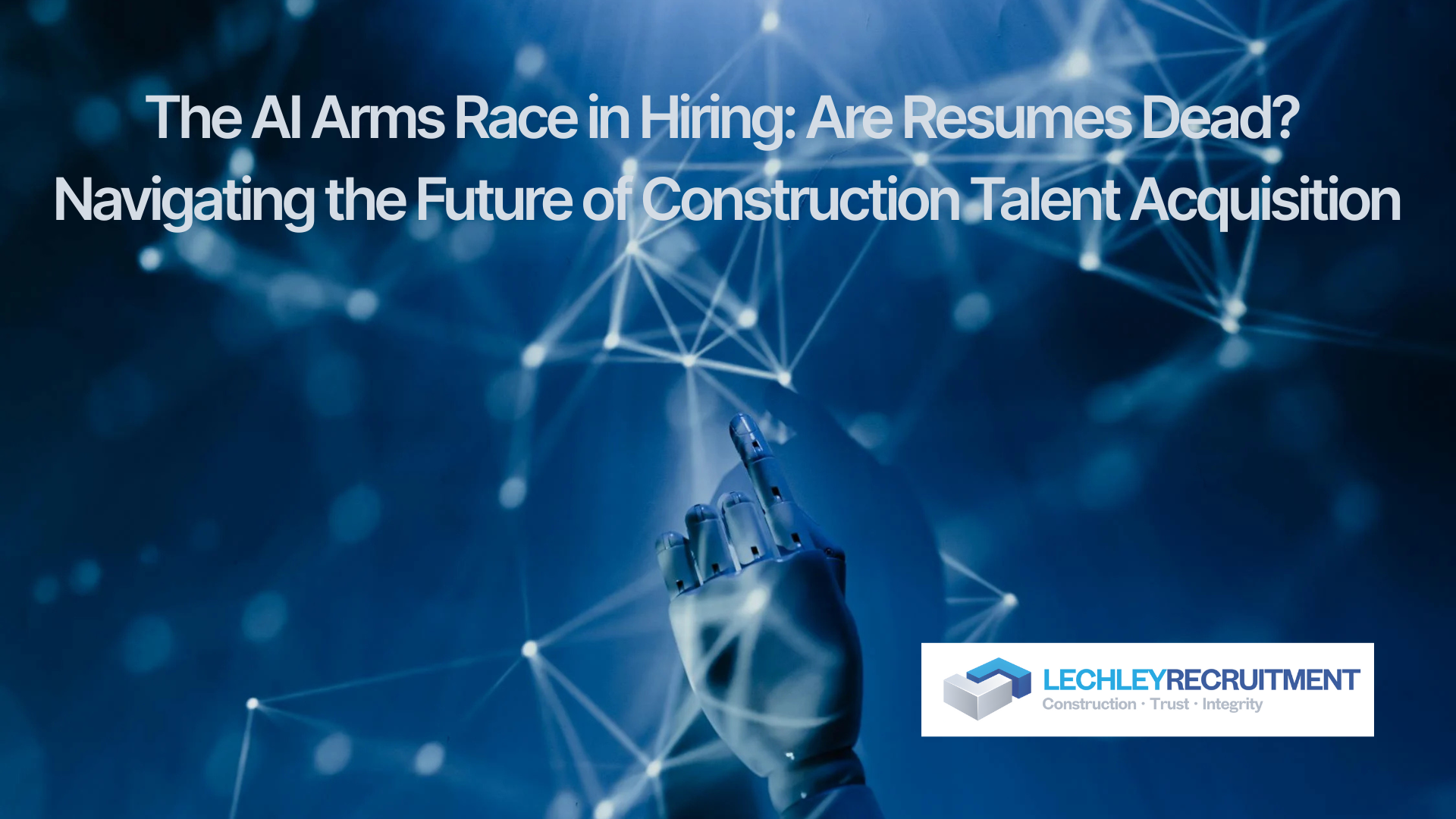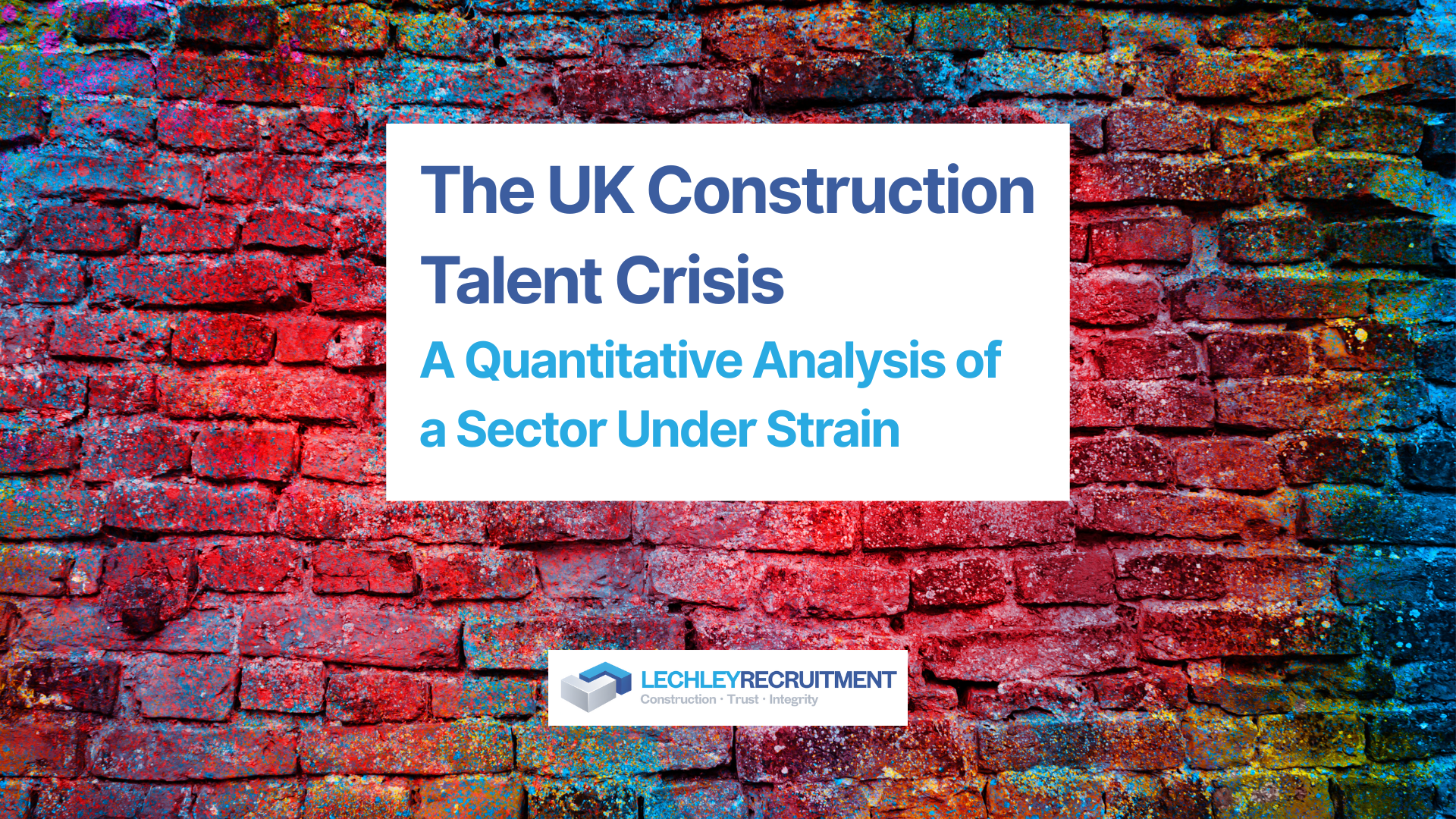The AI Arms Race in Hiring: Are Resumes Dead? Navigating the Future of Construction Talent Acquisition
The Future of CVs

Are you, as a senior leader in the UK construction or civil engineering sector, feeling the intense pressure of finding top-tier talent amidst an ever-deepening shortage? And, like many, are you wondering if the traditional CV still holds its weight in an era where AI seems to dictate initial impressions? The landscape of securing elite professionals has transformed, evolving into an unexpected AI arms race, often leaving critical gaps in your most ambitious projects.
Introduction
For decades, the CV has been the standard bearer, a crucial introduction to a candidate's professional journey. However, the rapid proliferation of Artificial Intelligence (AI) is fundamentally challenging its supremacy. Are traditional resumes truly dead, or are we witnessing a pivotal evolution? For firms undertaking complex infrastructure, rail, and hyper projects, the stakes couldn't be higher. This post delves into how AI is reshaping recruitment, the significant hurdles it poses for both discerning employers and exceptional candidates, and the vital, innovative assessment methods emerging to ensure that genuine, senior-level construction talent is not merely identified, but truly understood and secured. At Lechley Associates, we see this not as a threat, but as an opportunity to redefine excellence in construction recruitment.
The Current Battlefield: The Keyword Conundrum in Construction
For too long, Applicant Tracking Systems (ATS) have acted as the primary filter, sifting through applications based on keyword density. This led to a predictable, albeit frustrating, "keyword optimisation" culture where candidates meticulously tailored their CVs to satisfy algorithms, often at the expense of genuine personality or nuanced experience.
Now, with sophisticated AI tools at their fingertips, a significant majority of job seekers – often as high as 60-67% in the UK – are leveraging AI to refine their CVs and cover letters. This means a deluge of highly polished, keyword-rich documents hitting your inbox, making it increasingly difficult for internal recruitment teams to discern true quality and the deep, specific experience required for senior construction roles. If every application looks algorithmically perfect, how do you identify the actual best-in-class Project Director or the truly visionary Civil Engineer who embodies the success and integrity your firm demands? The traditional "spray and pray" from candidates, now AI-enhanced, drowns out the unique signals of elite talent.
The Employer’s AI Arsenal: Efficiency vs. The Indispensable Human Element
Leading construction firms are, understandably, exploring and adopting AI. Larger organisations, particularly those with vast recruitment volumes, are increasingly using AI for:
- Automated CV Screening & Shortlisting: Beyond basic keyword matching, AI can analyse context, identify career progression patterns, and even gauge the relevance of project experience, aiming to streamline the initial funnel.
- Predictive Analytics: Leveraging historical data, AI can forecast which candidates might excel in specific roles or identify potential retention risks.
- Conversational AI & Chatbots: These tools can handle initial candidate queries, manage interview scheduling, and provide 24/7 support, enhancing administrative efficiency.
While the appeal of speed and reduced administrative burden is clear, a critical concern is emerging among senior HR professionals and directors in the construction sector: the potential erosion of authenticity. Many recruiters (around 74%) worry that AI-driven applications feel less genuine, making it profoundly harder to assess the invaluable soft skills, leadership qualities, problem-solving acumen, and cultural fit that define truly successful senior hires in construction. The danger lies in algorithms inadvertently filtering out exceptional, experienced professionals whose unique career paths or profound on-site expertise don't neatly align with predefined keyword lists. For Lechley Associates, where a deep understanding of character and a global network built on trust are paramount, relying solely on AI would be to miss the very essence of what makes a candidate "the best."
Beyond the Static Document: Precision Assessment for Elite Construction Talent
The solution for securing the best people in construction is to move decisively beyond the limitations of the static CV. It's about embracing dynamic, multi-faceted assessment methods that provide tangible evidence of capability and cultural alignment. The future isn't about AI replacing human insight; it's about AI empowering a more precise, nuanced, and ultimately successful talent acquisition strategy.
Here are the innovative approaches gaining significant traction, proving vital for identifying and attracting the calibre of professional your projects demand:
- Video Submissions & Asynchronous Video Interviews: What they offer: Candidates record short video responses to specific challenges or provide a concise "video resume" showcasing their communication style and leadership presence. These allow for efficient, flexible review. Impact for senior construction roles: For roles demanding strong client interaction, team leadership, or on-site problem-solving, video provides an invaluable early insight into a candidate's executive presence, clarity of thought, and ability to articulate complex solutions – qualities a written CV simply cannot convey.
- Skills-Based Assessments & Gamified Evaluations: What they offer: This is a crucial trend, with 81-85% of UK employers now prioritising skills over pure credentials. Instead of just listing proficiencies, candidates demonstrate them. This can involve complex project simulations relevant to hyper projects, advanced technical challenges in civil engineering, or case studies requiring strategic decision-making in infrastructure development. Gamified assessments, often subtly measuring cognitive abilities and behavioural traits, offer an engaging way to reveal natural aptitudes. Impact for senior construction talent: These objective assessments provide undeniable evidence of a candidate's actual capabilities, directly validating their ability to perform under pressure and deliver results on large-scale, intricate projects. This approach significantly reduces bias and offers a fairer, more accurate evaluation than relying solely on past titles or academic qualifications – especially pertinent as many UK employers now remove rigid degree requirements.
- Enhanced Psychometric Evaluations: What they offer: Moving far beyond generic personality tests, modern psychometric tools are highly validated, ethical instruments that measure cognitive abilities (e.g., numerical reasoning for financial oversight of large projects, spatial awareness for design), behavioural traits, motivational drivers, and cultural alignment. Over three-quarters of UK HR professionals now use these. Impact for your ideal candidates: For the senior professionals who drive your projects, these tests provide deep insights into how they lead, how they handle adversity, and how well they integrate into your firm's specific culture. They are invaluable for assessing adaptability, resilience, and the strategic thinking crucial for long-term success.
- Digital Portfolios & Verified Credentials (Leveraging Trust and Transparency): What they offer: Far more dynamic than a traditional CV, a digital portfolio is a comprehensive, interactive showcase of a candidate's project successes, including photos, videos, technical drawings, and detailed descriptions of their contributions. The emerging use of blockchain-verified credentials offers an immutable, secure record of qualifications and experience, virtually eliminating credential fraud. Impact for the construction industry: For roles where tangible outputs matter, a portfolio provides direct, verifiable evidence of a candidate's capabilities and past successes. Blockchain adds an unparalleled layer of trust and efficiency to background checks for senior hires, crucial in an industry where reputation is everything.
- "Reverse Pitches" and Candidate-Led Project Presentations: What they offer: Instead of merely answering questions, candidates are tasked with preparing and delivering a strategic presentation on how they would approach a specific, real-world business challenge relevant to your firm's current or upcoming projects. Impact for senior roles: This method directly assesses strategic thinking, complex problem-solving, communication skills under pressure, and initiative – all hallmarks of successful senior construction leadership. It mirrors the demands of their future role, providing a genuine demonstration of their value.
The Lechley Associates Difference: Precision in a Post-CV World
At Lechley Associates, we recognise that in this evolving landscape, the search for the best people in construction demands far more than algorithms. With 23 years of expert, boots-on-the-ground construction industry knowledge – honed from my own experience with firms like Sir Robert McAlpine and across global markets – I bring an unparalleled understanding of what truly constitutes elite talent in our sector.
My extensive global network, built through decades of industry relationships and university connections, means I don't just find a candidate; I find the candidate. We believe in honesty, trust, and innovating the recruitment process by prioritising a deep understanding of both the client's complex requirements and the candidate's long-term aspirations. This commitment to quality, integrity, and genuine character judgment is why we favour an approach that takes the time to uncover the right individuals, often through exclusive or retainer agreements – because finding the best isn't a race; it's a strategic investment.
While AI provides valuable tools for efficiency, it cannot replicate the nuance of human judgment, the insight into cultural fit, or the power of a trusted referral. For your tier 1 projects and your critical leadership gaps, you need a partner who understands the intricacies of the construction industry from the inside out, who can spot true talent beyond a keyword match, and who is dedicated to securing professionals who will not only succeed but also contribute to your firm's legacy.
What are your thoughts, fellow construction leaders and professionals? Have you experienced the challenges and opportunities of AI in hiring? Which of these new assessment methods do you believe holds the most promise for securing the truly exceptional talent your projects demand? Share your insights and experiences below – let's shape the future of construction recruitment together





